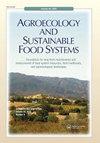农业生态学教学:为学生探索未知领域做好准备
IF 2.6
3区 农林科学
Q1 AGRICULTURE, MULTIDISCIPLINARY
引用次数: 0
摘要
本文章由计算机程序翻译,如有差异,请以英文原文为准。
Teaching agroecology: preparing students for navigating uncharted territory
ABSTRACT Agroecologists understand that farming and food systems are more complex than the aggregation of their components. This realization drives our choices of learning strategies and activities that will prepare students for complexity and uncertainty. Our quest for a just, sustainable, and nutritious food system adequate to equitably serve everyone on the planet today and into the future is an enormous challenge. An undertaking of this magnitude will be met only with major adjustments informed by thoughtful teaching and practicing problem solving skills through a new educational lens. The principles of agroecology help us focus this lens on the wicked problems of today and the future, and prepare students for navigating uncharted territory. The dimensions of such education are broad, transdisciplinary, and long term. In this commentary, we explore agroecology as an emerging platform to understand the holistic nature of systems, to navigate the complications of unpredictable change, and to deal with how we can frame relevant questions for ourselves and our students in a rapidly changing biological and social environment.
求助全文
通过发布文献求助,成功后即可免费获取论文全文。
去求助
来源期刊

Agroecology and Sustainable Food Systems
AGRICULTURE, MULTIDISCIPLINARY-GREEN & SUSTAINABLE SCIENCE & TECHNOLOGY
CiteScore
4.80
自引率
7.70%
发文量
73
期刊介绍:
Agroecology and Sustainable Food Systems is devoted to the rapidly emerging fields of agroecology and food system sustainability. By linking scientific inquiry and productive practice with transformative social action, agroecology provides a foundation for developing the alternative food systems of the future. The journal focuses on the changes that need to occur in the design and management of our food systems in order to balance natural resource use and environmental protection with the needs of production, economic viability, food security, and the social well-being of all people.
Agroecology and Sustainable Food Systems examines our current food systems from production to consumption, and the urgent need to transition to long-term sustainability. The journal promotes the study and application of agroecology for developing alternatives to the complex problems of resource depletion, environmental degradation, a narrowing of agrobiodiversity, continued world hunger, consolidation and industrialization of the food system, climate change, and the loss of farm land. The journal uses a food systems approach, and seeks experiences in agroecology that are on-farm, participatory, change-oriented, and backed by broad-based methodologies of sustainability analysis and evaluation.
 求助内容:
求助内容: 应助结果提醒方式:
应助结果提醒方式:


